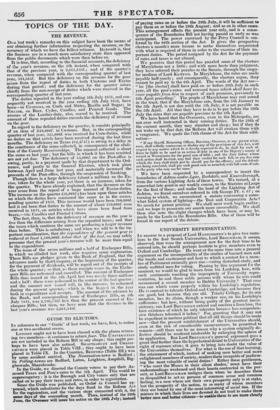• GUIDE TO ELECTORS.
IN reference to our "Guide" of last week, we have, first, to notice one or two accidental errors.
LONDON ought not to have been classed with the places return- ing two members—it continues to return four. The UNIvEasiriES are not included in the Reform Bill in any shape; this ought per- haps to have been also noticed. SHAFTESBURY and CHRIST- CHURCH were placed in Table VIII.; they ought to have been placed in Table IX. In the Counties, BEDFORD (Table III.) was by some accident omitted. The Nomination-town is Bedford ; its Polling-towns are Bedford, Luton, Leighton, Ampthill, Big- gleswade, Sharnbrooke.
In the Guide, we directed the County voters to pay their As- sessed Taxes and Poor's-rates to the 5th April. This would be supererogatory : it is the Borough and City voters only that are .called on to pay their taxes and rates, in order to registration. Since the Guide was published, an Ord ei in Council has ap-
rorred, which substitutes for the days fixed in the Reform Act
• the registration, and the various steps connected with it, the same days of the succeeding month. Thus, instead of the 20th June, the Overseer will issue his notice on the 20th July; instead
of paying rates on or before the 20th July, it will be sufficient to pay them on or before the 20th August; and so on in other cases, This arrangement affects the present year only, and is a conse- quence of the Boundaries Bill not having passed so early as was anticipated. The power exercised by the Privy Council is con- ferred by the 80th section of the Act. It gives the prospective electors a month's more leisure to make themselves acquainted with what is required of them in order to the exercise of their im- portant duties. The period assigned by the Act for the payment of rates and taxes is not altered.
We perceive that this period has puzzled some of the electors of Marylebone not a little; and with more baste than judgment, they have referred their puzzles to the Senate, through the singu- lar medium of Lord KENYON. In Marylebone, the rates are made payable half-yearly; and consequently, the electors argue, they cannot be paid up to the 6th April. The words of the Act are- " he [the elector] shall have paid on or before 20th July in such year, all the poor's-rates and assessed taxes which shall have be- come payable from him. in respect of such premises, previously to 6th April preceding." The people of Marylebone may rest sound in the trust, that if the Marylebone rate, from the 5th January to the 5th April, is not due until the 5th July, it is not payable on the 5th April. All that they have to do is to pay before the 20th July the rates that are payable previous to the 6th April.
We have heard that the Overseers, even in the Metropolis, are not over well instructed in their coming duties. To the 20th of
the current month, they may slumber and sleep ; but if they do not wake up by that day; the Reform Act will awaken them with a vengeance. We quote the 76th clause of the Act for their edification— "If any Sheriff, Returning Officer, Barrister, Overseer, or any person what- ever, shall wilfully contravene or disobey any of the provisions of this Act, with respect to any matter which he is hereby required to do, he shall for such of- fence be liable to be sued in an action of debt in any of his Majesty's courts of record at Westminster for the penal suns of 5001.; and the Jury before whom such action shall be tried, may find their verdict for such full, or any less sum which the Jury shall think just he should pay for the offence ; and the defend- ant being convicted, shall pay such penal suns so awarded, with full costs of suit, to the party who may sue for same."
We have been requested by a correspondent to insert the boundaries of Ashton-under-Lyne, Rochdale, and Knaresborough, from the various Lighting Acts of these towns. We turned, at a somewhat late point in our weekly course, to the Statutes at Large for the first of these; and under the head of the Lighting Act of Ashton, we found ourselves referred to 6th George IV. c. 67; on turning to which, we encountered a statute concerning a some- what faded system of lighting—the Test and Corporation Acts! So much for patent printing. We shall next week begin earlier; and we hope to prosecute our search more successfully. We shall then also note the slight changes which have been, or may be, made by the Lords in the Boundaries Bills. One of these will be found in our report of the debate.


























 Previous page
Previous page